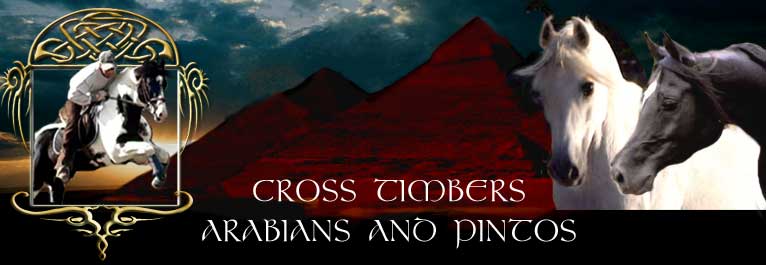|
Information and tips we have found concerning horse dental problems and health.
Routine dental care is essential to your horse's health. Periodic examination, corrections and regular maintenance are necessary for a number of reasons. We have modified the hores's diet and eating patterns trhough domestication and confinement. We demand more from our performance horses, beginning at a younger age than ever before. Breeders often select breeding animals withoug regard to dental considerations.
Horses get two sets of teeth in their lifetime. An adult male horse has 40 permanent teeth. A mare may have between 36-40 teeth because mares are less likely to have canine teeth.
The following chart shows the approximate ages at which different teeth are first visible in teh mouth. By referring to it, you may detect potential abnormalities of your own horse associated with teething. For more information, refer to the Official Guide for Determining the Age of the horse, published by the American Association of Equine Practitioners. It should be noted that there can be significant variation in when teeth come in between individual horses and breeds of horses.
| Deciduous (Baby Teeth) |
|
| 1st Incisors (centrals) |
Birth or 1st week |
| 2nd Incisors (intermediates) |
4-6 weeks |
| 3rd Incisors (corners) |
6-9 months |
| 1st, 2nd, and 3rd premolars (cheek teeth) |
Birth or first 2 weeils forall premolars |
| Permanent (Adult Teeth) |
|
| 1st Incisors (centrals) |
2.5 years |
| 2nd Incisors (intermediates) |
3.5 years |
| 3rd Incisors (corners) |
4.5 years |
| Canines (bridle) |
4-5 years |
| Wolf teeth (1st premolars) |
5-6 months |
| 2nd Premolars (1st cheek teeth) |
2.5 years |
| 3rd Premolars (2nd cheek teeth) |
3 years |
| 4th Premolars ( 3rd cheek teeth) |
4 years |
| 1st molars (4th cheek teeth) |
9-12 months |
| 2nd molars (5th cheek teeth) |
2 years |
| 3rd molars (6th cheek teeth) |
3.5-4 years |
Common Dental Problems:
- Sharpe enamel points forming on cheek teeth, causing lacerations of cheeks and tongue.
- Retained caps
- Discomfort caused by bit contact with the wolf teeth
- Hooks forming on the upper and lower cheek teeth
- Long and/or sharp canine teeth interfering with the insertion or removal of the bit.
- Lost and/or broken teeth
- Abnormal or uneven bite plnaes
- Excessively worn teeth
- Abnormally long teeth
- Infected teeth and/or gums
- Misalignment/poor apposition
- Gum disease
Recognizing Dental Problems:
- Loss of feed from mouth while eating, difficulty with chewing, or excessive salivation
- Loss of Body Condition
- Large or undigested feed particles in manure
- Head tilting or tossing, bit chewing , tongue lolling, fighting the bit, or resisting bridling
- Poor Performance, such as lugging on the bridle, failing to turn or stop, even bucking
|
